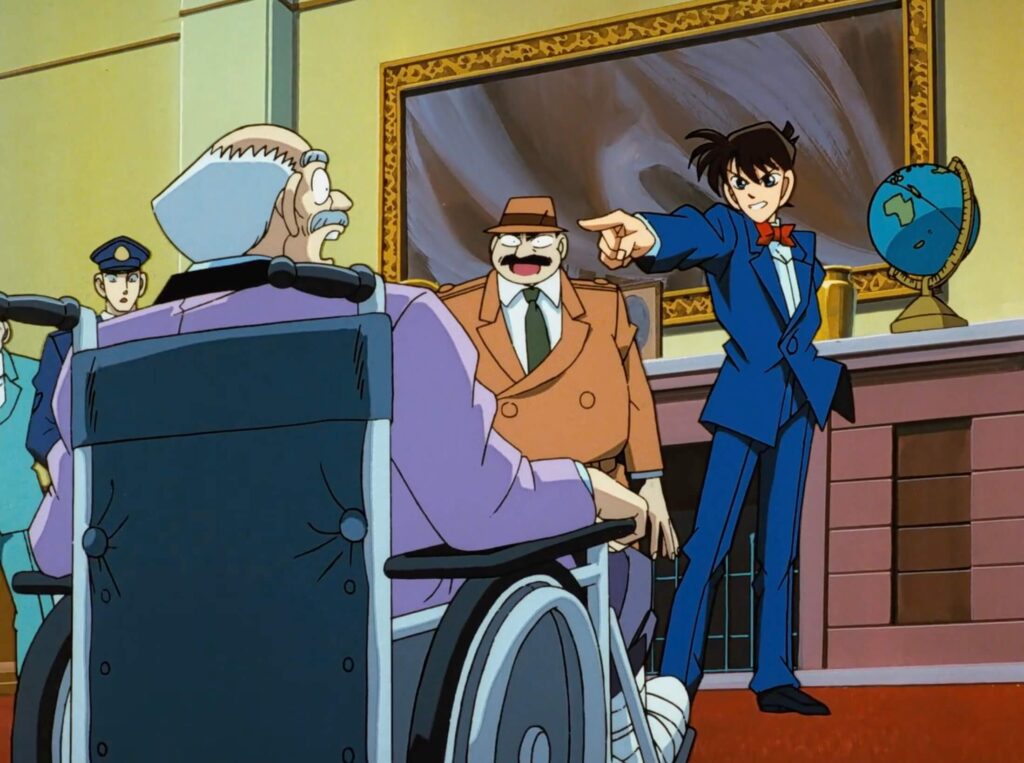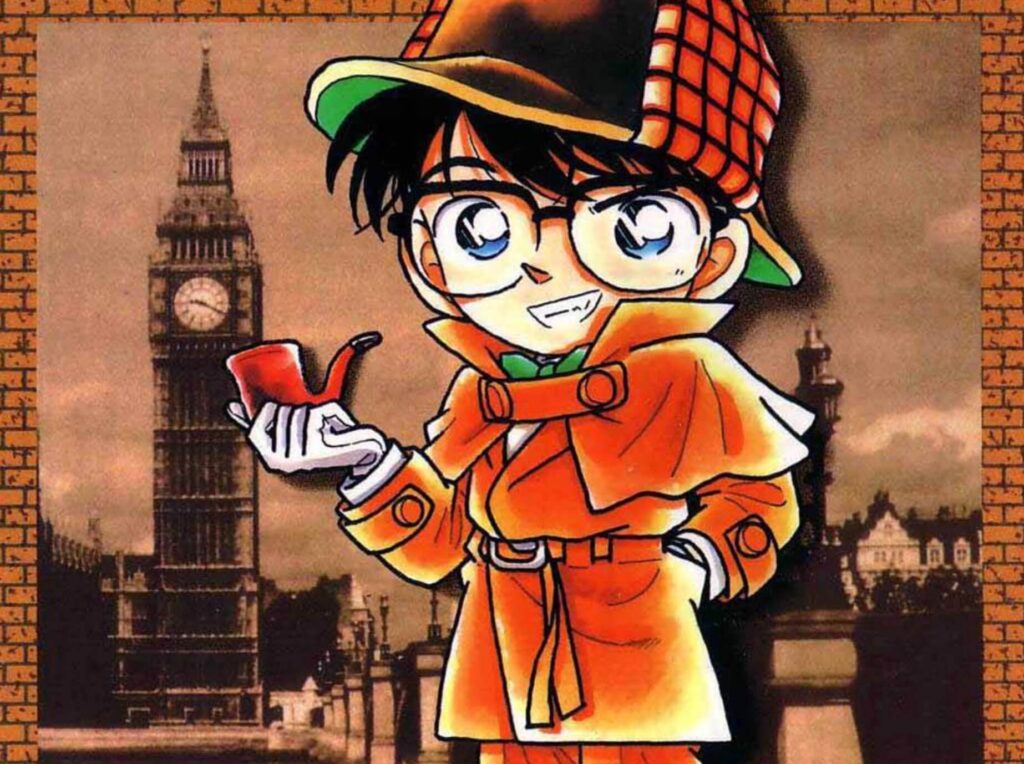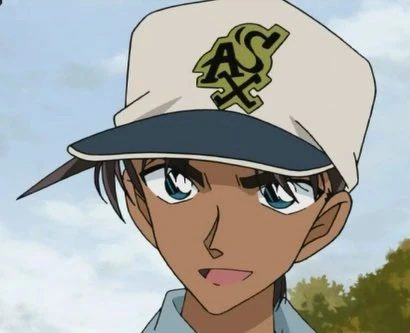Can you learn Japanese with Detective Conan? Let’s investigate how this captivating detective anime can actually help you learn Japanese. This show is a clever work teeming with crime-solving, puzzles, and a plethora of daily situations, which may prove to be an excellent tool for studying Japanese. This article is a continuation of our “Learning Japanese with Anime” series, where we’ve broken down some of the most iconic anime, Attack on Titan, Naruto, One Piece, and My Hero Academia. This time, we will be putting Detective Conan on trial.
Why Learn Japanese with Detective Conan?
Anime often has a reputation for being unrealistic for learning practical Japanese, however, most do give you exposure to a lot of natural conversation. Detective Conan is no exception, being filled with useful dialogue and language that is very effective for natural Japanese practice.
If you are pursuing the immersion method for language learning, the show has over 1000 episodes, providing plenty of material to dive into. It’s an engaging language reservoir for a wide range of social situations, regional dialects, and everyday conversation. This makes the show perfect for both beginners and intermediate-level learners.
Dialogue:
The anime title consists of very useful dialogue that centers around daily life, work/school, and even introduces new topics since each episode would be about different characters, their interests, and lifestyles. Also, due to the crime-solving theme, there is a lot of conversation about animate/inanimate objects, space, measurements, and moving parts. This is great practice for understanding how to properly use language regarding these everyday things and objects.
Varied Speech Styles And Accents:
Certain characters, such as Heiji Hattori who is from Osaka, have regional accents. This can be useful exposure to different dialects in Japan. In addition to the recurring cast, each episode introduces unique characters of differing ages, backgrounds, and personalities allowing for a wide range of speech styles we can learn from.
Formal And Casual Language:
Detective Conan frequently uses both formal and casual forms of speaking which are important distinctions in Japanese. Adult characters often speak formally to other adults especially those considered of high social position. One of the most frequent words in the show is 社長(shachou) meaning president/director. You can expect to hear a lot of formal language around these ‘important’ characters.
Wide Range of Vocabulary:
The vocabulary reflects more relatable settings one would likely be exposed in day to day life in Japan. It also has many words surrounding police work and crime solving. It consists of language that isn’t too complicated for younger audiences but it doesn’t talk down to them either. This enables the show to be a great resource to introduce lots of new words. Below is a short list from the 100 most frequently used words from the show:
| Japanese | Pronunciation | English |
| 犯人 | はんにん han’nin | Culprit |
| 部屋 | へや heya | Room |
| 事件 | じけん jiken | Crime case, incident |
| 音 | おと oto | Sound, noise |
| 電話 | でんわ denwa | Phone, call |
| 警部 | けいぶ keibu | Police inspector |
| 遺体 | いたい itai | Corpse, remains |
| 殺害 | さつがい satsugai | To kill, murder |
| 被害 | ひがい higai | Injury, harm |
| 社長 | しゃちょう shachou | Company president, manager |
Getting Started Learning Japanese with Detective Conan
Detective Conan is great for both beginners and intermediate learners due to its family-oriented nature while still containing more complex dialogue.
For Beginners:
For absolute beginners, starting off with subtitles would allow you to make the most out of learning Japanese with Detective Conan. However, listening actively and paying attention to the actual dialogue is the most effective for picking up new words. We recommend using an app or a notebook to record new vocabulary you pick up and drill into your memory.
For Intermediate Learners:
If you already have some Japanese abilities, try going without the subtitles. I know it can be intimidating at first and may take time to adjust. But stick with it and don’t worry about understanding every single word. You can always pause and go back to see if you missed something. The show is meant for all audiences, including kids around 10 and older, so the show utilizes repetitive language and ideas to help younger audiences keep up while still being appealing to adults. This makes the show a perfect balance of complex and simple dialogue for intermediate learners.
Key Phrases and Expressions
Here are some common phrases and expressions that could prove useful to familiarize when watching the show:
犯人はあなただ!(hanin wa anatada): The culprit is you!
名探偵 (meitantei): Great or famous detective and is used in the Japanese name of the show, 名探偵コナン(meitantei conan). 探偵(tantei) by itself means private detective.
刑事 (keiji): Police detective or police investigator, they often handle criminal investigations
捜査 (sousa): Criminal investigations, another term often used for investigating is 調査(chousa) which can be used outside of crime.
わかったんだよ!この事件の真相が… (wakattandayo! konojiken no shinsou ga…): I know the truth behind this case!
Key Japanese Quotes from Detective Conan
Shinichi’s Catchphrase: There’s Always One Truth

Shinichi’s most memorable and quotable catchphrase, best translated as “One truth will always prevail!”. He says this throughout the show since he knows there is one truth to the case and it is up to him as a detective to find it.
- Japanese: 真実はいつも一つ!
- Romaji: Shinjitsu wa itsumo hitotsu!
- English: There is always one truth!
Breaking down the sentence:
真実はいつも一つ!
| 真実 | は | いつも | 一つ |
| shinjitsu | wa | itsumo | hitotsu |
| Truth | Subject particle | Always | One (count) |
Conan’s Ripoff From Sherlock Holmes

A recurring theme of the show is how much Conan admires Sherlock Holmes. Even the name he gives himself comes from the author, Sir Arthur Conan Doyle. The line by our main protagonist, Conan, echoes a quote from the famous Sherlock Holmes novels:
- Japanese: 不可能な物を除外していって残った物が、たとえどんなに信じられなくても、それが真相なんだ。
- Romaji: fuganouna mono wo jogai shiteitte nokotta monoga, tatoe donna ni shinjirarenakutemo, sore ga shinso nanda.
- English: When you eliminate the impossible, whatever’s remaining, no matter how unbelievable, is the truth.
- Original Sherlock Holmes Quote: When you have eliminated the impossible, whatever remains, however improbable, must be the truth
Breaking Down The Sentence:
不可能な物を除外していって
| 不可能な | 物 | を | 除外していって |
| fuganouna | mono | o | jogaishiteitte |
| Impossible | Things | Object particle | Eliminate/exclude |
残った物が、たとえどんなに信じられなくても、それが真相なんだ。
| 残った物 | が | たとえ | どんなに | 信じられなくても | それ | が | 真相なんだ |
| nokottamono | ga | tatoe | donnani | shinjirarenakutemo | sore | ga | shinsounanda |
| Remaining things | subject particle | Even it, although | no matter how | unbelievable | that | subject particle | (is the) truth |
Heiji Hattori’s Famous Quote

Heiji Hattori is close friend to Conan and a famous highschool detective from Osaka. His most popular line couldn’t have been said more eloquently as it shows his intelligence, maturity, and even his regional dialect:
- Japanese: 命には限りがあるから大事なんや… 限りがあるからがんばれるんやで…
- Romaji: Inochi ni wa kagiri ga arukara daijinan ya… kagiri ga arukara ganbareru n’yade…
- English: Life is limited, that’s why it’s so important. Since there’s a limit, we can do our best.
Breaking down the sentence:
命には限りがあるから大事なんや…
| 命 | には | 限り | がある | から | 大事 | なんや |
| Inochi | niwa | kagiri | ga aru | kara | daiji | nanaya |
| Life | Subject paricle | Limit, finite | has/have | since, because | important | Osaka/Kansai Regional nuance |
限りがあるからがんばれるんやで…
| 限り | がある | から | 頑張れるん | やで |
| kagiri | ga aru | kara | ganbarerun | yade |
| Life | Has, there is | because, since | to do one’s best | Osaka/Kansai Regional nuance |
Tips To Successfully Learning Japanese With Detective Conan
Based on the quotes I shared earlier, there are plenty of really cool, well-written lines you can try to learn and remember to level up your Japanese. If you really want to get serious about reinforcing new language with Detective Conan, here are a few tips that could help:
- Use Flashcard Apps (Like Anki): Detective Conan may introduce a lot of new vocabulary and grammar, so in order to ingrain them into memory, using flashcard apps that use spaced repetition is a very effective method of memorizing and drilling new material.
- Take Note of Character Personalities: Different characters will have different mannerisms, regional dialects, and unique linguistic nuances. This makes the show a great resource for a wide range of Japanese language exposure, but keeping track of characters who speak differently and why (like Heiji Hattori speaking in Kansai-ben) may help clear up some confusion.
- Visual Learning: In addition to great dialogue around solving criminal cases, there is plenty of visuals to go along with the explanations. This allows you to see exactly what is being described which will no doubt be helpful in picking up the language.
- Pay Attention To Context And Humor: It shows the daily life of Japan and the different cultural contexts involved in different situations. There is also plenty of humor, which will help to pick up more playful and organic language.
- Pause and Repeat: Feel like you missed something or heard a new word? Pausing and repeating scenes is a great way to reinforce new material or ensure you’re understanding everything you need to. If one scene is just going way over your head, try that scene alone with subtitles and see what you’re missing (this does still help with picking up the language).
Closing Thoughts On Learning Japanese With Detective Conan
Learning Japanese with Detective Conan not only provides plenty of Japanese language practice but it’s very entertaining and rewarding. The series consists of great storytelling overflowing with well-written mysteries and puzzles that you feel like you’re solving alongside the characters. This, along with each episode featuring different situations, events, and unique characters, the show is a rich resource for a wide range of language in everyday Japan.
So, as Conan likes to say, 「真実はいつも一つ! (shinjitsu wa itsumo hitotsu)」or “One truth always prevails!” and the truth in this case is that Detective Conan is a remarkable instrument for practicing Japanese! If you want to practice what you learn and hear from Detective Conan, try out our classes!
FAQ
Is Detective Conan good for learning Japanese?
Yes, Detective Conan is an amazing resource for learning Japanese. It offers a wide range of characters with different regional dialects, interests, and personalities. Each episode features different situations usually involving daily life activities in Japan. The language in the investigations involves words for police, detectives, and how to describe specific objects and moving parts. These are all excellent for practicing natural Japanese conversation.
Is Detective Conan Japanese difficult?
The Japanese contains a mix of complex and simple language. The show is meant to be appealing to both children and adults so there is more repetitive language and a lot of visuals to go along with dialogue. So, it’s perfect listening practice for intermediate level Japanese learners but beginners can learn a lot too with help of subtitles.
Is Detective Conan popular in Japan?
Yes, Detective Conan is one of the most popular anime in Japan today. They consistently rank one of the highest views weekly. And the movies are some of the highest grossing animations to hit Japan’s theaters.
What is the hardest level of Japanese?
On the JLPT (Japanese Language Proficiency Test) scale, the N1 is the most difficult level. This level consists of very rigorous academic vocabulary, reading material, and kanji.
How intelligent is Detective Conan?
Detective Conan, before he was transformed into a child, was a prodigy high school detective (which is still quite young). So, he is basically a genius as a child detective since he still has the brains of his former self. As a child/highschool kid, he is able to solve complicated cases with very little information before any adults do. This makes him far beyond average intelligence.
Want to study Japanese with us?
Feature Image from Seiyu Wiki
